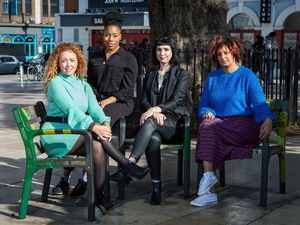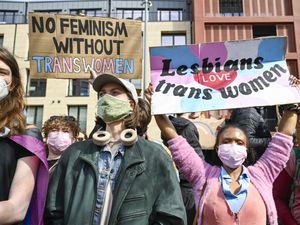General Election: What minor parties are standing this year?
There are 333 registered political parties in the UK including a raft of minor and lesser known groups.

There are 333 registered political parties in the UK with nearly 70 standing in the General Election.
This includes a raft of minor and lesser known parties.
Each political candidate must pay a £500 deposit to stand, which will be lost if they do not get at least 5% of the votes in their constituency.
Here, we look at some of the smaller parties contesting the election.
Church of the Militant Elvis Party
It sounds like a party dedicated to the King of Rock and Roll but the Church of the Militant Elvis Party is about far more as it pushes for improved daytime television and legalising brothels.
Founder and only member David Bishop started the party in response to the proposal for a high speed train in Nottinghamshire.
“The money would be better spent on the bus services and railways we got rather than wasting it on the high train,” he told the PA news agency.
While scrapping the high speed train remains a top priority for the party, which also goes by the name Militant Elvis Anti HS2, it is not the only issue in its manifesto.
On Brexit, he wants Britain to “pretend to leave the EU but actually stay in”.
He said one of his “most popular” policies is “free neutering for stray cats and Boris Johnson”.
Another issue which he says “really gets him going” is the reduction in the number of public lavatories and has pledged to replace the public toilets which are being closed.
Other manifesto issues include legalising brothels which Mr Bishop argues will make it safer for women, imposing a speed limit on cyclists using footpaths and improving daytime television.
Mr Bishop stood in the Nottingham City Council by-election for Clifton North under the Bus-Pass Elvis Party.
Yorkshire Party
The Yorkshire Party is fighting for the north which they argue has been failed by major political parties and deserves better.
The party, founded in 2014, is led by former primary school teacher Chris Whitwood.

It has 28 candidates contesting the General Election right across Yorkshire, which is nearly double that of their first general election in 2015.
Mr Whitwood said the party is seen as a “positive alternative” and attributes its growth to the feeling by the community that it has been neglected by major political parties in Westminster.
“It’s an acknowledgement that for so many years Westminster has let down the people of Yorkshire and the north of England as a whole,” he told the PA news agency.
“There’s a feeling that Yorkshire does deserve better.”
Mr Whitwood pointed to the recent floods in the area as an example of how the area has been neglected while the South East is favoured.
“Two years ago the Government was told flood defence spending plans favoured the South East and then when the floods did hit it took days for the prime minister to recognise that it was a national emergency by which time whole towns were under water, people were homeless and someone actually died,” he said.
The Yorkshire Party leader said transport was another issue for the region and a key part of the party’s manifesto.
The party also supports the Brexit referendum but will push for a free trade agreement for Britain.
Women’s Equality Party
The Women’s Equality Party (WEP) wants to move beyond the MeToo movement to tackle the cultures and systems awash with violence and abuse against women.
The party, which has five candidates contesting the General Election, praises the MeToo movement for giving a platform to women who have been abused, but said it is time to move further.
“We need that movement to go beyond individual stories and tackle the individual cultures and systems,” leader Mandu Reid told the PA news agency.
“You could look at what we’re doing as a continuation, as the next wave of the MeToo movement.”
The party’s five female candidates are all survivors of abuse and violence and are standing in constituencies where the sitting MPs have been accused of violence and harassment.

Ms Reid said this “guerrilla approach” reflects their priority to end male violence against women and girls.
Ms Reid said four of the sitting MPs they stood against announced they would not be re-contesting in their constituencies.
The party has also offered to stand aside in some constituencies if other parties adopt their key policies.
Ms Reid said it has been a “brilliant success” with the Liberal Democrats agreeing to adopt the WEP’s key policies and in exchange the WEP candidates have stood down in two seats.
“In a guerrilla indirect way we are exerting influence over what the parties are doing,” she said.
“This is an opportunity to prioritise ending violence against women which is a crisis in my view.”
The party has three key manifesto policies including amendments to the Recall Act to allow constituencies to remove MPs found guilty of harassment, sustainable funding for refuges and front line services and universal free childcare.
The WEP is against Brexit.
Animal Welfare Party
The leader of the Animal Welfare Party is concerned the General Election will be dominated by Brexit and climate change will be pushed to the side.
Leader Vanessa Hudson said about the December 12 vote and Brexit: “Sadly I think climate change will come second in people’s list of priorities.”
The Animal Welfare Party, founded in 2006, has six candidates across the UK with most standing in London.
Ms Hudson said while the party is a dedicated voice for animals, it is also a party for the planet more broadly.
“Other parties might say we are a single issue party but we’re not, others will be focusing on human issues and the human population but there’s an elephant in the room,” she told the PA news agency.
“It’s not just people, it’s animals and the farm animal population.”

To address climate change she said people need to look at the way they are feeding themselves which is why the Animal Welfare Party’s number one manifesto policy is to lead the UK to a plant-based food system.
Other manifesto policies include increasing penalties for animal abuse, ending the badger cull, strengthening the fox hunting ban and ending live exports.
On Britain leaving the EU, the group opposes a hard Brexit and supports a second referendum on a final exit deal.
Asked how the party is different to the Green Party, Ms Hudson said: “We would say the Green Party have a lot of great issues on animals … but for us the reason many of us entered politics, we’ve all come to this as we feel animals needed a dedicated voice, someone who solely focuses on animal issues”.
Christian Parties Alliance
This General Election the Christian Parties Alliance (CPA) is focusing on one main seat – Walthamstow – and disrupting the sitting MP’s fight to decriminalise abortion.
The Christian Party Alliance has 29 candidates standing in the election – many of which are in London.
Party leader Sid Cordle said their campaigning will be focused on the north-east London district of Walthamstow against Labour candidate Stella Creasy.
Ms Creasy is a vocal campaigner for abortion rights and supported efforts to bring about a change in the law to see abortion decriminalised in Northern Ireland which the CPA disagrees with.
“To us it is morally totally indefensible,” he told the PA news agency.
“I felt that for this election we should still stand as many candidates as we can but focus campaigning all in one seat.”
The party, founded in 1999, has five main policies in their manifesto which include protecting unborn children and fighting crime by working with people when they leave prison to reduce re-offending rates.
They also support honouring the 2016 Brexit referendum and giving grants to people who get married and for their first child.
The Peace Party
The Peace Party is going into this General Election campaigning that remaining in the EU is vital to maintain peace across Britain.
The party’s leader John Morris, who is one of two candidates standing in the December 12 poll, said the group is in favour of Britain belonging in the EU.
“In the present situation we would go along with the idea of revoking article 50 and stopping the Brexit process,” he told the PA news agency.
“The EU is vital for the maintenance of peace.
“My parents lived through two world wars, I lived through one and my children and grandchildren haven’t … That’s a bit of a clue of how important I believe the EU is towards the maintaining of peace.”
Mr Morris, who is this year contesting Guildford in Surrey, said it is clear what the party, which was founded in 1996, stands for from its name.
He said there are two ways to define peace, with his party supporting “positive peace” which means society is working in such a way that it supports everyone in “all ways possible”.
The party’s key manifesto policy is conflict resolution which includes campaigning for peaceful conflict resolutions, disband the armed forces, decommissioning all weapons and withdrawing from all current military commitments.
Other policies include using the proportional representation election system, legalising the sale, distribution and use of psycho-active substances and repealing legislation that prevents prisoners from voting.





